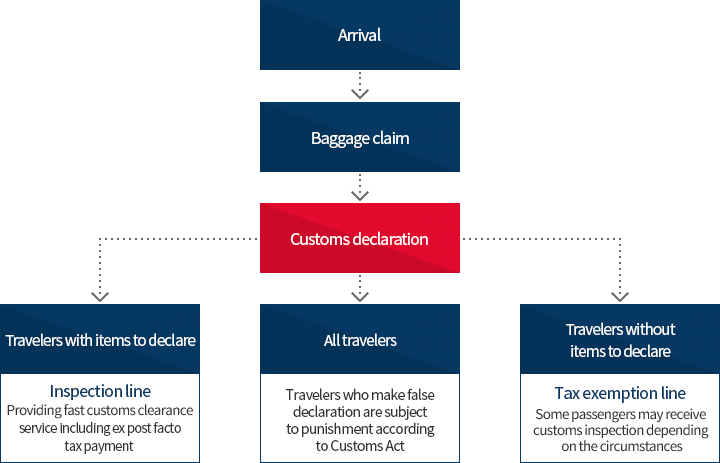Customs Clearance Guide for Passengers
Customs clearance procedure for passenger belongings
Customs clearance procedure for passenger belongings

Passenger belongings
- Personal goods and accessaries usually deemed necessary for the traveler
- Tools considered as required for the work of a non-resident traveler entering Korea
- Judging from the property, quantity, price, usage, etc. of the goods, the goods generally considered as the belongings of the traveler or a separate shipment
Tax exemption allowances
- - US$800 or less of the total taxable value of goods (for agricultural, livestock, and fishery products, up to 5kg of each good and 40kg of their total quantity and up to 100,000 Korean won of the price of all goods purchased overseas)
- Apart from the section above, 2 bottles of liquor (total volume up to 2L and US$400), 200 cigarette sticks, e-cigarette/liquid nicotine 20ml(Nicotine percentage less than 1%) and 100ml of perfume )
※ Minors under 19 years of age (based on year of birth) are not given tax exemption for liquor and cigarettes.
Legitimate declaration of passenger belongings
- When bringing goods that exceeds tax exemption allowances;
- Voluntary declaration: 30% reduction from the standard customs duty
- If detected after non-declaration: Imposition of additional tax (40% more than the regular tax; 60% more if exposed twice or more within 2 years)
Customs clearance of prohibited and restricted goods
- Prohibited goods: Sexually inappropriate materials, and forged/falsified/counterfeit currency, bond, and other marketable securities
- Restricted goods : Firearms, Narcotics; animals and plants stipulated in the Convention on International Trade of Endangered Species of Wild Fauna and Flora (CITES) and their products, etc.
All restricted goods need to fulfill all the requirements for customs clearance regardless of tax exemption threshold
Goods to be declared
- Goods exceeding tax exemption allowances
- Commercial products such as commercial goods, goods for repair, and sample
- Firearms, swords, explosives, gas sprayers, Taser guns, crossbow (including parts and imitation or ornamental crossbow), toxic or radioactive materials, and eavesdropping equipment
- Drugs such as marihuana, opium, and coca leaves; psychoactive drug; hemp and its product; medicines that may be misused or abused
- Books, photos, videotape, film, LD, CD, CD-ROM, etc that violate the state constitution, public security, and social customs
- Goods used for the leak of government secret or espionage
- Forged, falsified, or imitated currency, bill, banknote, bond, and other marketable securities
- Animal (including meat, skin, and hair), plant, fruit, vegetable, live fish; agricultural, forest, livestock, and fishery products (including processed goods); other foods
- Live wild animals and plants protected by the Convention on International Trade of Endangered Species of Wild Fauna and Flora (CITES) and products and processed goods made with them (tiger, leopard, elephant, ostrich, hawk, owl, cobra, turtle, alligator, sturgeon, coral, orchid, cactus, aloe, etc. and their stuffed specimens, fur, ivory, and handbag, purse, accessories, etc. made with them; oriental medicine made with animals such as gall bladder of bear and musk; elecampane, cibot rhizome, gastrodia, etc.; and oriental medicine or medical supplies made with them)
- Goods infringing on intellectual property rights, including trademark right
- Goods have taken out and brought in again by a traveler or a crew member who leaves the country temporarily
- Personal care goods, ornaments, and tools to be used during the period of stay by a traveler who enters the country temporarily and to be brought out again when leaving the country
- Goods to be kept in the customs with no intention of being exported into the country and to be brought out when leaving the country
- Means of payment, etc. exceeding US$10,000 according to Paragraph 1 of Article 5-11, Paragraph 2 of Article 6-2, and Paragraph 1 of Article 6-3 of the Foreign Exchange Transactions Regulations





